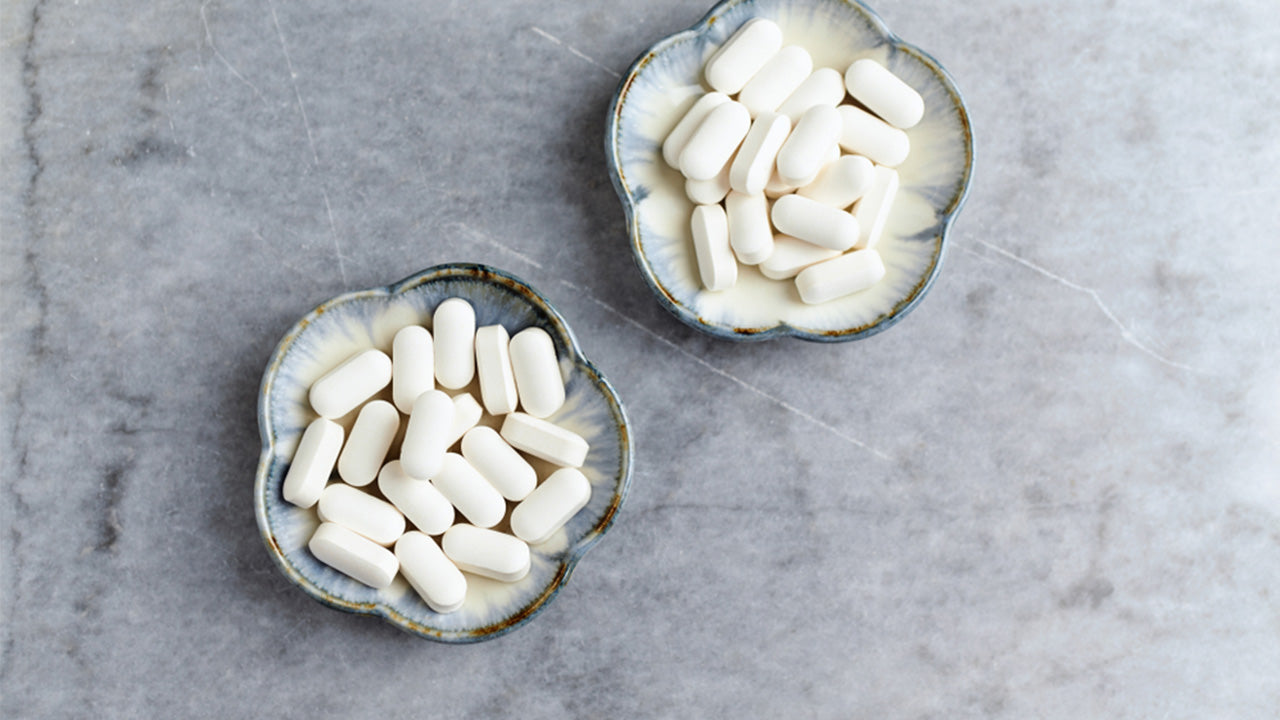Should You Supplement with the Amino Acid GABA?
 By: by Amino Science
By: by Amino Science

Gamma aminobutyric acid (GABA) is an amino acid that functions as a neurotransmitter in our brains. Low GABA levels are known to be associated with movement and anxiety disorders, so some people will take GABA supplements to help improve the function of their minds and central nervous systems. Read on to find out how GABA works, and whether or not it may be appropriate for you.
What Is GABA? How Does GABA Work? Where Can You Find It?
GABA is classified as an inhibitory neurotransmitter due to its ability to block certain signals in the brain. GABA decreases activity in the central nervous system and binds with proteins in the brain known as GABA receptors, which creates a calming effect that helps ameliorate feelings of fear, stress, and anxiety. GABA may also help prevent seizures.
Because of these abilities, GABA has become a popular dietary supplement.
For those who want to know how to increase GABA naturally, GABA is found in oolong, black, and green tea, and fermented foods like yogurt, kimchi, kefir, and tempeh. GABA production can be boosted by other foods, including nuts like almonds and walnuts, seafood like halibut and shrimp, whole grains, soy, beans, sunflower seeds, spinach, broccoli, fava, tomatoes, citrus fruits, berries, and cocoa.
Who Should Take GABA Supplements?
The reason people take GABA supplements is to get better access to its calming influence on the brain. GABA supplements are thought to relieve stress, and in so doing improve your overall health, because excess stress can lead to a weakened immune system, poor sleep quality, and a higher risk for anxiety and depression. There are also some health conditions that are associated with lower levels of GABA, so if you have any of the following health concerns, then GABA supplementation may be good for you.
People may need more GABA if they have:
- Anxiety disorders
- Attention deficit hyperactivity disorder (ADHD)
- Depression
- Hypertension
- Insomnia
- Panic disorders
- Mood disorders
- Movement disorders (including Parkinson's disease)
- Seizure disorders
Consult a qualified health care professional if you're on any other medications for these conditions, and ask your doctor if GABA supplements could help manage some of the symptoms associated with these disorders. If you're considering taking a GABA supplement, read on to find out how upping your intake of GABA affects your brain cells and may help improve your quality of life.

Are GABA Supplements Effective?
Even when supplementing with GABA, research suggests that only small amounts actually make it past the blood-brain barrier and reach your nerve cells. However, when it comes to some of the following uses of GABA, every little bit can count. Science also shows that it's important to balance the increased intake of GABA with other essential amino acids. You can do so by taking an EAA supplement.
Here is what the scientific research has to say about the effect of GABA on the human body.
GABA for Anxiety and Depression
This 2003 review on GABA usage for anxiety asserts that GABA is known to counterbalance the affect of the excitatory neurotransmitter glutamate, and plays a role in multiple neurobiological interactions that are relevant to those with anxiety disorders. It supports the use of GABAergic agents in treating anxiety, as does this 2012 article on the GABA system in anxiety and depression cases, which also points out that certain GABAA receptor modulators and GABAB antagonists could serve as potential antidepressants.
GABA for Insomnia
One small study from 2018 tested GABA on participants with insomnia and found that 300 milligrams of GABA taken an hour before going to sleep resulted in reports of people falling asleep faster and noting improved sleep quality in the first 4 weeks after starting GABA treatment. Though there were only 40 participants, these results suggest that effects of GABA supplements in humans may beneficially impact sleep habits.
GABA for High Blood Pressure
There are many studies that have evaluated GABA-containing products and their effectiveness at lowering blood pressure. A 2003 study published in the European Journal of Clinical Nutrition found that consuming fermented milk with GABA helped significantly lower blood pressure levels in participants with elevated blood pressure in 2-4 weeks (compared to the placebo group). And a 2009 study revealed that consuming a GABA-containing chlorella supplement 2 times a day lowered the blood pressure of subjects with borderline hypertension.
GABA for Stress and Fatigue
In 2011 Japanese researchers found that consuming a beverage with either 25 or 50 milligrams of GABA resulted in reduced measurements of physical and mental fatigue during problem-solving tasks, with the higher dose being slightly more effective.
A 2009 study published in the International Journal of Food Sciences and Nutrition showed that consuming chocolate containing 28 milligrams of GABA also reduced stress in participants as they performed a problem-solving test. Yet again in 2012, capsules with 100 milligrams of GABA led to reduced stress during the performance of a mental task. While these are small studies, they nevertheless appear to consistently show that GABA helps reduce stress and fatigue in human beings.
The Potential Side Effects of GABA Supplements
Though the side effects of GABA have not been specifically studied, there have been some reported side effects from people taking GABA supplements, including:
- Headache
- Muscle weakness
- Sleepiness
- Upset stomach
Since GABA appears to be useful in treating insomnia, it can cause feelings of sleepiness and shouldn't be taken before driving or operating heavy machinery until you're aware of how it affects you in whatever dosage you're consuming it at.
There is also very little research done on GABA's interaction potential with other supplements or medications, so it's recommended that you seek medical advice if you're currently taking any medication, particularly for insomnia, anxiety, or depression, and make sure that your doctor is aware of this or any other herb, supplement, or over-the-counter drug you're consuming.
Go Gaga for GABA
GABA is a natural part of our body's function, and plays an important role as a chemical messenger in our brains. Though the research on GABA as a supplement is somewhat skimpy, there are scientifically founded indications that it may help reduce anxiety, stress, high blood pressure, and insomnia.
It's not just "supplements or bust" with GABA however, as practicing yoga can also lead to an increase of GABA levels, up to 27%! With a little yoga, some fermented foods, and the right GABA supplement, you could have all the bases covered when it comes to reducing the symptoms of certain dangerous medical conditions, and getting your brain in the right frame of mind.

Up to 25% off Amino
Shop NowTAGS: supplements
Join the Community
Comments (0)
Most Craveable Recipes




 833-264-6620
833-264-6620



















